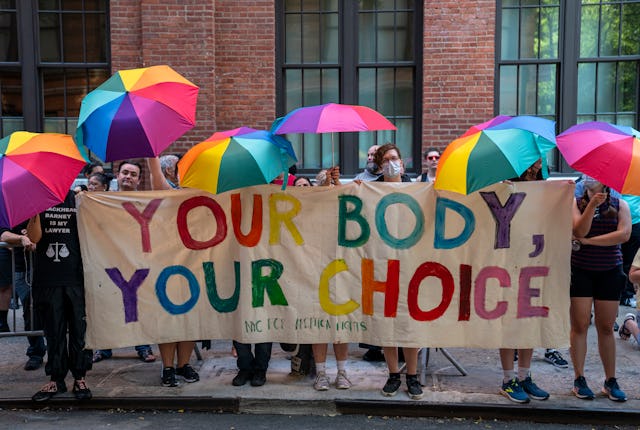A Florida Court Ruled A Teen Wasn't “Mature” Enough For An Abortion
The sixteen-year-old girl, identified only as Jane Doe 22-B, has no parents and is still in school.

When the U.S. Supreme Court overturned Roe v. Wade this spring, the judges ruled that the citizens of the United States do not have a federal, constitutional right to abortion — and abortion law was turned over to individual states.
For women in more conservative states, getting abortion care immediately became a lot more difficult.
In the case of one teenage girl in Florida, the fate of the rest of her life was held in the hands of a Florida court of appeal. The court ruled that the 16-year-old girl, only known as Jane Doe 22-B in court documents, had “not established clear and convincing evidence” that she was “mature” enough to decide if she wanted an abortion.
Instead, the state is now forcing the girl have a child. While deeming her not “mature” enough to make the decision to carry a child or not; she is deemed mature enough to become a mother. *scratches head*
According to the appeal decision, the teen “is almost seventeen years-old and parentless,” lives with a relative, and “has an appointed guardian.” She had previously gone to court to seek an exemption from a Florida law that would require consent from a parent or guardian to obtain the procedure. Her exemption was not granted. The teen — who is 10 weeks pregnant — also told the court that her guardian “was fine” with her obtaining the procedure, but they had never provided the required waiver.
Pleading her case for appeal of the original denial, the teen argued that she was not ready to become a parent. According to court documents, she was pursuing her GED “with involvement in a program designed to assist young women who have experienced trauma in their lives.” She also explained that the father involved in the pregnancy “is unable to assist her.”
In the original trial, the judge observed that the teen “showed, at times, that she is stable and mature enough to make this decision [and] acknowledges she is not ready for the emotional, physical, or financial responsibility of raising a child.” The judge also noted that the girl’s concerns about raising a child are “valid.”
However, the judge still chose to reject her case.
According to POLITICO, the court’s decision to deny the teen an abortion was just one of about 200 petitions filed by minors looking to bypass parental notification laws that Florida circuit court judges decide every year. An analysis of Florida court reports show the majority of those petitions are approved. Judges deny an average of 18 of those petitions each year.
One appeals court judge, Scott Makar, wrote in the opinion that the decision could be looked over again in a few days.
“Reading between the lines, it appears that the trial court wanted to give the minor, who was under extra stress due to a friend’s death, additional time to express a keener understanding of the consequences of terminating a pregnancy,” Makar wrote. “This makes some sense given that the minor, at least at one point, says she was open to having a child, but later changed her view after considering her inability to care for a child in her current station in life.”
So, on the up-side, all hope is not lost for Jane Doe 22-B who wants to stay in school, help others who have experiences trauma, and just keep being a teen.
Still — this is a chilling example of what might be in store for many more women in America, where a court and a judge can force you to carry a child against your wishes.